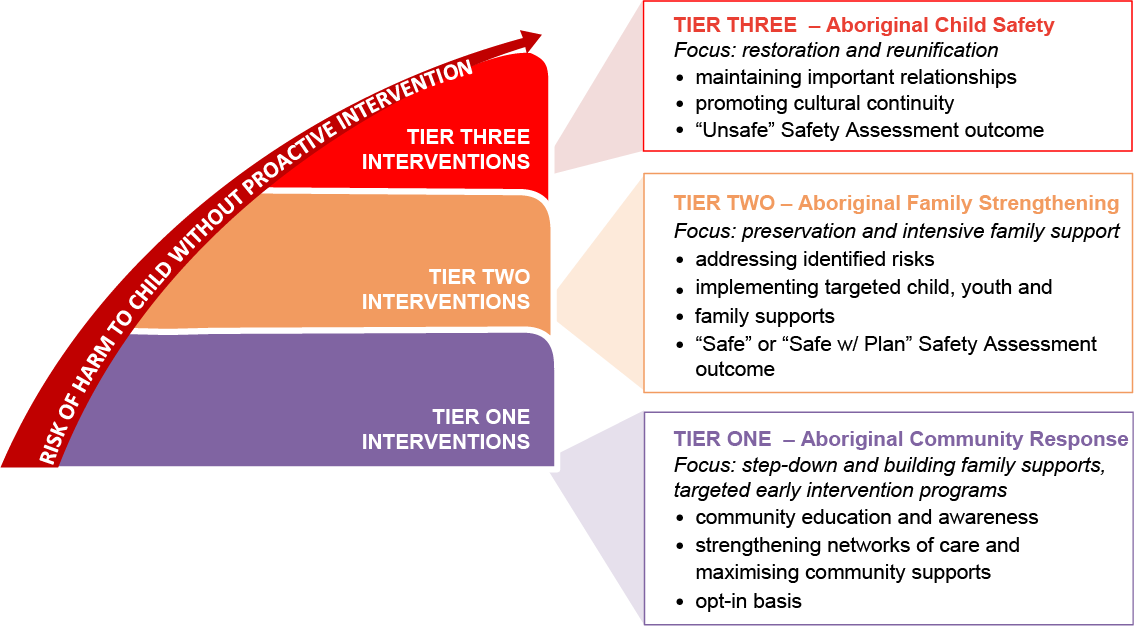Aboriginal Case Management Policy

Strengthening our families through an Aboriginal case management policy
The Aboriginal Case Management Policy (ACMP) is designed for caseworkers and practitioners working with Aboriginal children, young people and families. The ACMP was developed through an engagement process involving Aboriginal communities, AbSec, the Department of Communities and Justice and other key stakeholders.
The ACMP is designed to achieve safety and wellbeing for vulnerable Aboriginal children and young people by keeping them with or returning them to family and connected to their community and culture, it is holistic, culturally responsive and embeds the values and perspectives of Aboriginal people.
The ACMP and Rules and Practice guidance will provide case management that is tailored to the needs of Aboriginal children and families and commences early in the continuum of support. It aims to empower and support families and communities to reduce the incidence of harm, addressing identified risks and thereby supporting Aboriginal children and young people to thrive.
To learn more about the ACMP, watch the 5-minute explanatory video below, or if you would like a deeper understanding, the ACMP Introductory Training is available as an interactive short course, providing an exploration of the ACMP and the role of a caseworker within it.
View the Aboriginal Case Management Policy and Rules and Practice Guidance on the DCJ website.
Implementation Stage 1
AbSec and DCJ have completed stage one of implementation this has included:
- Established an Implementation Committee
- Initial evaluation of individual districts capacity, readiness and potential barriers and solutions to support implementation the ACMP
- Developed a range of key resources for ACCOs, organisations, caseworkers and practitioners including frameworks, fact sheets, case studies and an elearning package
Principles of the ACMP
Quality Aboriginal Case Management is practice that:
- is child focused to promote child safety and well-being
- facilitates Aboriginal family-led decision making
- values community involvement, including self-determination and advocacy
- is culturally embedded
- delivers holistic services tailored to the needs of Aboriginal children and families
- is oriented to prevent harm and preserve families
- is accountable to Aboriginal communities for the outcomes achieved for Aboriginal children and their families
Elements of the ACMP
The ACMP contains four core Elements:
| Aboriginal Family-led Decision Making | Pro-active Efforts Standard | Aboriginal Family-led Assessments | Aboriginal Community Controlled Mechanisms |
|---|---|---|---|
| A series of processes that are engaged early in the continuum of support, ensuring participation of families and communities in decisions and actions affecting them.
The core elements of Aboriginal Family-led decision making include an Aboriginal Community facilitator, family as key decision making partners, family made ‘family plans’ and follow up efforts. |
The element means that practitioners take meaningful and all possible steps to actively support families to address risks that are threatening the separation of a child from their family.
Practitioners demonstrate and document when the pro-active standard. |
Practitioners prioritise culturally valid assessment tools to identify and clarify the concerns related to the risk assessment.
They will work through a cultural lens and are supported by Aboriginal practitioners where possible. |
These unique approaches consist of a formal structure or process established by a local Aboriginal community through their own processes to represent the interests of the community.
They oversee decision-making processes affecting Aboriginal children, their families and communities. |
Aboriginal Continuum of Support
The ACMP introduces the Aboriginal Continuum of Support, aimed at achieving safety of an Aboriginal child before removal is required. It uses a series of early, holistic and tailored interventions in order to ensure that the needs of children are met as quickly and effectively as possible in a culturally safe way.
The continuum is broken into three levels of intervention based on timing, and intensity. It targets the intervention to correspond to the level of risk, safety and level of care required for each child. Each program will provide culturally-appropriate and locally –relevant services that cater to the needs of the child, their family and their community.

Further Reading
Key themes that emerged during the workshops, including your views and key messages, can be found in our workshop report.
We have prepared an overview of the key themes arising from our stakeholder consultations – please read What you Told Us – Aboriginal Case Management Policy Consultations.
A further summary of the key themes emerging from our survey is available here.
Find out more about the Aboriginal Case Management Policy through the introductory training!
Through three training modules, the Aboriginal Case Management introductory training identifies key practice approaches and highlights the importance of self-determination when supporting Aboriginal children and their communities.